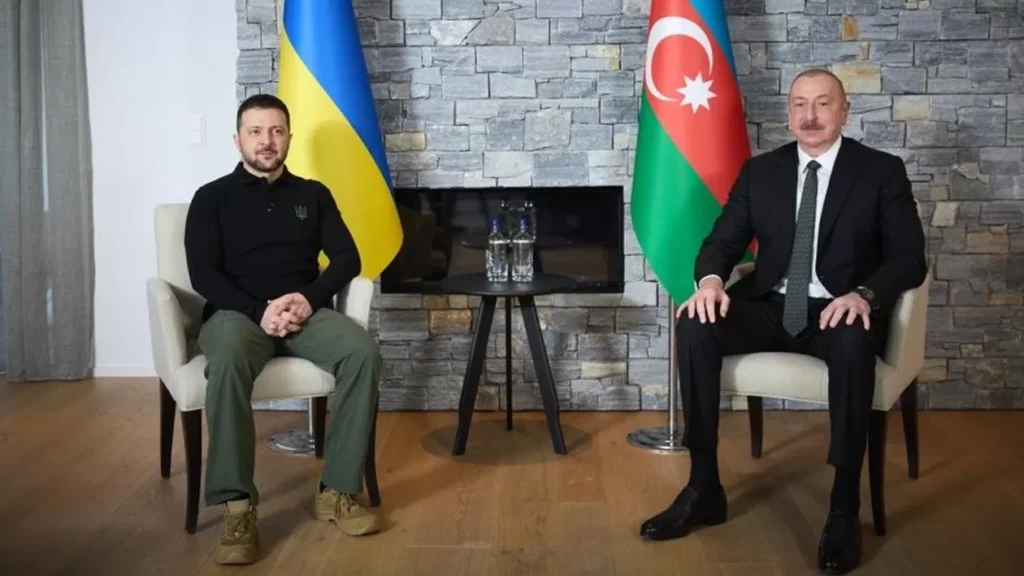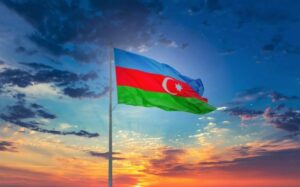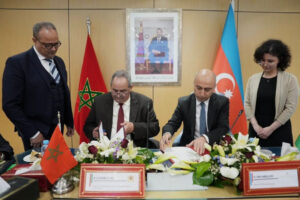Understanding the Strong Azerbaijani-Ukrainian Friendship: A Strategic Partnership in the Making

In a recent development, Azerbaijani President Ilham Aliyev signed a decree on August 11 allocating $2 million in humanitarian aid to Ukraine. According to the decree, the funds will be used by Azerbaijan’s Ministry of Energy to purchase domestically produced electrical equipment and deliver it to Ukraine. The financing will come from the president’s reserve fund under the 2025 state budget.
The Ministry of Finance is tasked with providing the necessary funding, while the Cabinet of Ministers will oversee the implementation of the decree. The document also highlights that Azerbaijan has sent humanitarian aid to Ukraine multiple times in recent years in response to the ongoing crisis.
To understand how relations between Ukraine and Azerbaijan have become so strong, it’s important to recognize their shared history. Both countries are former Soviet republics that gained independence from the USSR and quickly developed a close friendship. Their strategic cooperation spans political, economic, and cultural domains, with Ukraine being one of Azerbaijan’s key military partners—second only to Turkiye.
Moreover, both nations have consistently shown mutual respect in their foreign policy relations. Since Russia’s invasion of Ukraine, Azerbaijan has repeatedly expressed its full support for Ukraine. Azerbaijan also openly criticized Russia’s annexation of Crimea.
Ukraine is one of Azerbaijan’s major import partners, further strengthening their economic ties. For example, Ilham Aliyev met with Ukrainian President Volodymyr Zelensky in Brussels in December 2021.
Following Russia’s full-scale invasion of Ukraine on February 24, 2022, both Azerbaijani political elites and the general public demonstrated strong support for the Ukrainian people, as documented by Bedford and Aliyev (2024). Shortly after the invasion began, hundreds of Azerbaijanis gathered in front of the Ukrainian embassy in Baku. The Azerbaijani government responded swiftly by sending humanitarian aid and announcing that SOCAR, the state oil company, would provide free fuel for ambulances and emergency vehicles at its gas stations in Ukraine.
By the end of 2023, Azerbaijan had allocated over $30 million in humanitarian aid and support for rebuilding Ukraine’s damaged infrastructure.
Why the European Union Should Collaborate with Azerbaijan?
From this perspective, the European Union (EU) should actively collaborate with Azerbaijan in countering Russia and its invasion of Ukraine. Following Azerbaijan’s victory in 2023, the country has even been described as emerging as a regional hegemon. As a rising power in the South Caucasus and a trusted partner of Western nations, Azerbaijan is becoming an indispensable ally for the EU.
A deeper analysis reveals that Russia has also played a central role in preventing the resolution of the Nagorno-Karabakh conflict. Since the imperial and Soviet eras, Russia has consistently fostered division among regional populations. It brokered the two ceasefires between Armenia and Azerbaijan in 1994 and 2020, yet its involvement has often served its own strategic interests rather than peace.
Azerbaijan’s foreign policy increasingly promotes regionalization, including the revival of the Six Country Regional Cooperation Platform and efforts to build alliances with Central Asian nations. The country is positioning itself as a bridge between East and West, connecting Europe with Central and broader Asia.
This bridging role is gaining even more significance with the development of the Zangezur Corridor, now named after President Trump. The corridor is envisioned as a strategic route linking Central Asia through the Caucasus to Türkiye, the EU, and beyond—effectively revitalizing the ancient Silk Road and enhancing connectivity across continents.
Azerbaijan’s Shift Toward Ukraine and Rising Tensions with Russia
In recent months, Azerbaijan has moved closer to Ukraine, gradually abandoning its traditional policy of balancing relations between major powers. Tensions between Azerbaijan and Russia have escalated, particularly following a plane crash involving Azerbaijan Airlines in December 2024, for which Baku holds Russia responsible.
Another serious incident has further strained relations: on Friday, June 27, in Yekaterinburg (Ural region), Russian police carried out a violent raid targeting the Azerbaijani diaspora, which numbers between one and two million people in Russia. During the operation, two brothers—Hussein and Ziyaddine Safarov—died of “heart failure” during interrogation, according to the Russian Investigative Committee. However, footage released by Russian media showing six men in court, one with a severely bruised face, leaves little doubt about the brutality of the police methods.
On Sunday, June 29, Azerbaijan’s Ministry of Foreign Affairs summoned the Russian ambassador to express a “strong protest” regarding the Yekaterinburg raid. In response, Baku announced the cancellation of all cultural events organized with Russian institutions, both public and private. Additionally, Russian food products were declared “unfit for consumption” and publicly destroyed.
As the French newspaper Le Monde wrote:
“Azerbaijan no longer tolerates the arrogance of its former tutelary power and responds tit for tat.”
Another French outlet, RFI, added:
“The two countries are sinking into a diplomatic crisis; the friendship between Russia and Azerbaijan now seems like a distant memory.”
The relationship between Ukraine and Azerbaijan has evolved into a model of strategic cooperation and mutual support. Azerbaijan’s tangible contributions to Ukraine’s post-war reconstruction, particularly in the energy sector, reflect a shared commitment to regional stability and sovereignty.
In this light, the European Union should actively deepen its partnership with Azerbaijan. As a key player in the South Caucasus and a vital energy corridor to Europe, Azerbaijan offers both geopolitical leverage and practical support in countering Russian influence. Strengthening trilateral cooperation between the EU, Ukraine, and Azerbaijan would not only bolster Ukraine’s resilience but also enhance Europe’s energy security and strategic autonomy.
Such collaboration could become a cornerstone of a broader European strategy for peace, reconstruction, and resistance to authoritarian aggression.
More article? From Neutrality to Global Impact: Turkmenistan’s Role in LLDC3 and International Affairs – https://eureflect.com
BIBLIOGRAPHY
Bedford, S., & Aliyev, N. (2024). The End to “Balancing” Foreign Policy? Why the Invasion of Ukraine Matters for Azerbaijan. A World Order in Transformation?, 90.
Eruygur, B. (2025, 11 août). Azerbaijan’s president signs decree on providing $2M in humanitarian aid to Ukraine. Anadolu Agency. https://www.aa.com.tr/en/russia-ukraine-war/azerbaijan-s-president-signs-decree-on-providing-2m-in-humanitarian-aid-to-ukraine/3656288
Kaylan, M. (2025, 10 août). The Armenia-Azerbaijan peace deal and the new Trump corridor. Forbes. https://www.forbes.com/sites/melikkaylan/2025/08/10/the-armenia-azerbaijan-peace-deal-and-the-new-trump-corridor/
Khomenko, I. (2025, 21 juillet). Russian propaganda calls for war with Azerbaijan after Aliyev backs Ukraine. UNITED24 Media. https://united24media.com/latest-news/russian-propaganda-calls-for-war-with-azerbaijan-after-aliyev-backs-ukraine-10044Le Monde. (2025, 3 juillet). Tensions d’ampleur inédite entre la Russie et l’Azerbaïdjan, qui cherche à s’affirmer. Le Monde. https://www.lemonde.fr/international/article/2025/07/03/tensions-d-ampleur-inedite-entre-la-russie-et-l-azerbaidjan-qui-cherche-a-s-affirmer_6617699_3210.html


